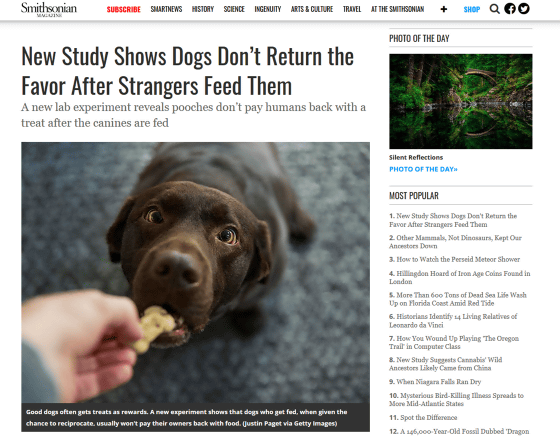Research results show that dogs do not give back to strangers who feed them

Dogs are known to be closely related to humans, and past studies have shown that they 'try to help their suffering owners' and ' act to relieve their suffering.' .. However, in a new treatise published by an Austrian research team, the results of an experiment were reported that 'dogs do not try to thank strangers who feed them.'
Dogs fail to reciprocate the receipt of food from a human in a food-giving task
https://journals.plos.org/plosone/article?id=10.1371/journal.pone.0253277
Dogs May Not Return Their Owners' Good Deeds --Neuroscience News
https://neurosciencenews.com/dogs-human-altruism-18931/
New Study Shows Dogs Don't Return the Favor After Strangers Feed Them | Science | Smithsonian Magazine
https://www.smithsonianmag.com/science-nature/dogs-dont-return-favor-after-strangers-feed-them-180978170/

Food plays an important role in connecting dogs and humans, and the research results that the wolf, the ancestor of dogs, was domesticated and became a dog because 'humans gave leftover food to wolves'. There is also. Therefore, a research team led by Jim McGetrick of the University of Veterinary Medicine in Vienna conducted an experiment to investigate 'whether a dog fed by humans feeds humans in return.'
The research team collected 37 dogs of more than 10 breeds and hybrids and taught them how to use the 'feeder that feeds when you press a button'. Each dog has a variety of personalities, some dogs pushing buttons with a gentle touch, some dogs scratching buttons or biting boxes containing buttons, and some dogs pushing buttons with their hind legs for some reason. That thing. “No doubt, dogs have very different personalities,” said McGetrick.
When each dog remembered that 'pressing a button, food comes out,' the research team put the dog in a small room that had only the body of the feeder and no buttons. The feeder button was in the room next to the small room with the dog, where there was a stranger human participant. Dogs and humans can see each other through the wire mesh, and participants with the role of 'kind humans' push buttons to make them look like dogs and feed them from the feeder. It was.
On the other hand, the participants who played the role of 'unfriendly humans' pressed the 'dummy button that does not feed' with a steel heart, no matter how much the dog stared at or screamed. The dog, who couldn't get food because he was paired with an unfriendly person, seemed to snort and look frustrated. 'I was surprised to find out how big a problem it was when a dog was with an unfriendly person and didn't get food in the situation he expected to get,' McGetrick said. I will.

The research team then reversed the situation between dogs and humans, this time placing buttons in the small room with the dog and installing a feeder in the small room with the humans. Of course, it seems that chocolate sweets were being served instead of dog food from the feeder in the small human room.
This time, if a dog pushes a button, a human can get a chocolate candy, but the dog was not so interested in pushing the button. In addition, there was no difference in the frequency with which dogs pressed buttons to feed humans with chocolate candies between 'kind humans' who fed dogs and 'unfriendly humans' who did not feed dogs. That is, the research team reports that the dog pressed the same button for both groups, whether or not they fed them earlier.
Also in this experiment, the two small rooms were separated by a wire mesh, and dogs and humans were able to interact with each other. According to the research team, dogs do not seem to make a distinction between 'kind humans' and 'unfriendly humans' in physical interaction, and approached both groups in the same way. That thing.

McGetrick points out that dogs may not always be grateful to strangers or may not be pondering the behavior of others, according to the results. On the other hand, 'I would like to emphasize that this was a very specific experimental situation,' he added, adding that dog behavior may be specific to the experimental situation.
In addition, although strangers participated in this experiment, if it was the owner who participated in the experiment, it is possible that the dog will press the button more frequently. Also, the situation of 'pressing a button to give back to the other person' may require a great mental leap for the dog. The research team may have learned that the dog presses a button 'only when the feeder is near him' or may not be aware that he is 'the one who feeds humans' in the first place. I think there is also sex.
Boston University psychologist Angie Johnston , who, like Stevens, did not participate in the study, to look at all the possibilities that could explain why dogs didn't thank humans for food. He pointed out that a lot of research is needed. He argues that a good starting point is a study of already highly trained military and service dogs. 'Knowing the interaction between dogs and humans is important in training service dogs and assistance dogs,' he said.

Related Posts:







